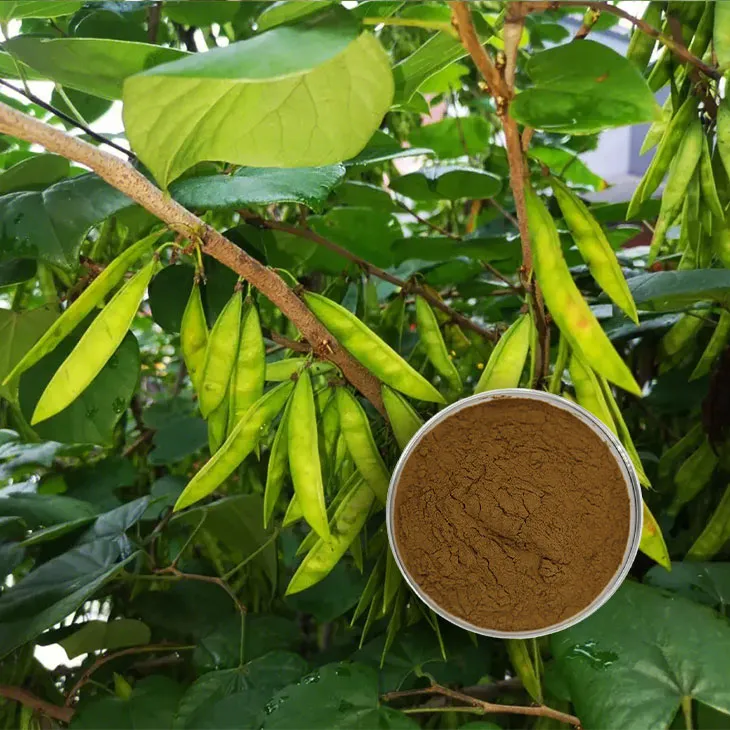- 0086-571-85302990
- sales@greenskybio.com
From Plant to Product: The Journey of Cannabinoid & Terpene Rich Hemp Oil Through Saponin Extraction
2024-08-14

1. Introduction
Hemp has been used for various purposes for centuries. In recent years, the focus has shifted towards the extraction of valuable components from hemp, such as cannabinoids and terpenes. These components are found in hemp oil, which has significant potential in multiple industries. Saponin Extraction is a key process in isolating and purifying these components, and understanding this journey from the plant to the final product is of great importance.

2. The Hemp Plant: Source of Valuable Compounds
2.1 Botanical Characteristics
Hemp (Cannabis sativa L.) is a versatile plant with distinct botanical characteristics. It has long, slender stalks and serrated leaves. The plant is dioecious, meaning it has separate male and female plants. Female hemp plants are of particular interest when it comes to cannabinoid and terpene production as they tend to have higher concentrations of these compounds.2.2 Biosynthesis of Cannabinoids and Terpenes
Cannabinoids are synthesized in the glandular trichomes of the hemp plant. These trichomes are small, hair - like structures that cover the surface of the plant, especially the flowers and leaves. The biosynthesis of cannabinoids, such as cannabidiol (CBD) and tetrahydrocannabinol (THC), involves a complex enzymatic pathway. Terpenes, on the other hand, are synthesized through a different metabolic pathway in the plant. They are responsible for the characteristic aroma and flavor of hemp. Some common terpenes found in hemp include myrcene, limonene, and pinene.

3. Harvesting and Preparation of Hemp for Oil Extraction
3.1 Optimal Harvest Time
Determining the optimal harvest time is crucial for maximizing the content of cannabinoids and terpenes in hemp. Generally, hemp is harvested when the female plants are in the flowering stage. This is when the concentration of these valuable compounds is at its peak. Harvesting too early or too late can result in lower yields of cannabinoid - and terpene - rich hemp oil.3.2 Drying and Curing
After harvesting, the hemp needs to be dried and cured properly. Drying helps to reduce the moisture content of the plant, preventing mold growth and spoilage. Curing, which is a more controlled process, further enhances the flavor and quality of the hemp. It allows for the breakdown and transformation of certain compounds, which can improve the overall profile of the cannabinoids and terpenes in the final hemp oil.
4. Extraction of Hemp Oil: An Overview
4.1 Traditional Extraction Methods
There are several traditional methods for extracting hemp oil. One of the most common is the solvent - based extraction method. Solvents such as ethanol or hexane are used to dissolve the cannabinoids and terpenes from the hemp plant material. However, these methods have some drawbacks, including the potential for solvent residues in the final product and the need for careful handling of the solvents due to their flammability and toxicity.4.2 Modern Extraction Technologies
Modern extraction technologies, such as supercritical CO₂ extraction, have gained popularity in recent years. Supercritical CO₂ extraction offers several advantages. It is a clean and efficient method that can selectively extract cannabinoids and terpenes without leaving harmful residues. The process involves using carbon dioxide in a supercritical state, which has properties similar to both a gas and a liquid. This allows for precise control over the extraction process, resulting in a high - quality hemp oil product.

5. Saponin Extraction: The Key Process
5.1 What are Saponins?
Saponins are a group of natural compounds that are found in many plants, including hemp. They have surfactant - like properties, which means they can reduce the surface tension of liquids. In the context of hemp oil extraction, saponins can interact with other components in the plant material.5.2 Role of Saponin Extraction in Isolating Cannabinoids and Terpenes
The saponin extraction process plays a crucial role in isolating cannabinoids and terpenes. Saponins can form complexes with unwanted substances in the hemp oil, such as lipids and proteins. By removing these complexes through saponin extraction, the purity of the cannabinoid - and terpene - rich hemp oil can be significantly increased. This allows for a more refined and concentrated product that is suitable for various applications.
5.3 Saponin Extraction Methods
There are different methods for saponin extraction. One approach is the use of aqueous extraction, where water is used as the solvent. Another method involves the use of enzymatic hydrolysis, which can break down the saponin - containing structures more selectively. Each method has its own advantages and disadvantages, and the choice of method depends on factors such as the desired purity of the final product, cost, and scalability.6. Purification and Quality Control of Cannabinoid - and Terpene - Rich Hemp Oil
6.1 Purification Steps
After saponin extraction, further purification steps are often required. These may include filtration, chromatography, and distillation. Filtration can remove any remaining solid particles or impurities. Chromatography techniques, such as high - performance liquid chromatography (HPLC), can be used to separate and purify the individual cannabinoids and terpenes. Distillation can help to remove any remaining solvents or volatile compounds, further enhancing the purity of the hemp oil.6.2 Quality Control Measures
Quality control is essential in the production of cannabinoid - and terpene - rich hemp oil. This includes testing for the presence and concentration of cannabinoids and terpenes using analytical methods such as gas chromatography - mass spectrometry (GC - MS). Additionally, tests for contaminants such as pesticides, heavy metals, and microbial contaminants are necessary to ensure the safety and quality of the final product.7. Benefits and Potential Applications of Cannabinoid - and Terpene - Rich Hemp Oil
7.1 In the Pharmaceutical Industry
Cannabinoid - and terpene - rich hemp oil has shown potential in the pharmaceutical industry. CBD, for example, has been studied for its anti - inflammatory, analgesic, and anti - anxiety properties. Terpenes can also enhance the bioavailability and therapeutic effects of cannabinoids. Research is ongoing to develop new drugs based on these components for the treatment of various diseases, including chronic pain, epilepsy, and mental health disorders.7.2 In the Cosmetic Industry
The antioxidant and anti - inflammatory properties of cannabinoids and terpenes make hemp oil a valuable ingredient in the cosmetic industry. It can be used in skin care products such as creams, lotions, and serums to improve skin health, reduce inflammation, and combat signs of aging. Hemp oil is also believed to have moisturizing and nourishing effects on the skin.7.3 In the Food and Beverage Industry
In the food and beverage industry, cannabinoid - and terpene - rich hemp oil can be used as a dietary supplement. It can be added to foods such as energy bars, smoothies, and oils. However, strict regulations govern the use of hemp - derived products in food and beverages to ensure consumer safety.
8. Conclusion
The journey of cannabinoid - and terpene - rich hemp oil through saponin extraction is a complex and multi - step process. From the hemp plant to the final product, each stage plays a crucial role in ensuring the purity, quality, and potential applications of the hemp oil. Saponin extraction is a key step in isolating and purifying these valuable components, and with proper purification and quality control, cannabinoid - and terpene - rich hemp oil has the potential to make significant contributions in various industries, from pharmaceuticals to cosmetics and food.
FAQ:
What are cannabinoids and terpenes?
Cannabinoids are a class of compounds found in hemp plants. They interact with the body's endocannabinoid system and are known for various potential health benefits. Terpenes, on the other hand, are aromatic compounds. They contribute to the smell and flavor of hemp products and also have potential therapeutic properties.
Why is hemp oil rich in cannabinoids and terpenes important?
Hemp oil rich in cannabinoids and terpenes has multiple importance. In the medical field, cannabinoids may offer relief for pain, inflammation, and other conditions. Terpenes can enhance the overall effect through what is known as the 'entourage effect'. In the cosmetic industry, it can be used for skin health. Also, in the food and beverage industry, it can add unique flavors and potential health - promoting properties.
How does saponin extraction work in the process?
Saponin extraction typically involves using solvents or other chemical processes. First, the hemp material is prepared. Then, the appropriate solvent is added to dissolve the saponins along with cannabinoids and terpenes. Through a series of steps such as filtration and separation, the saponins are separated from the desired cannabinoid - terpene - rich fraction. This helps in purifying and isolating the valuable components.
What are the potential applications of cannabinoid and terpene - rich hemp oil?
The potential applications are diverse. In the pharmaceutical industry, it could be used in the development of new drugs for various ailments. In the wellness sector, it can be used in supplements for general health improvement. In the agricultural field, it may have potential uses in pest control or plant growth promotion. Additionally, in the textile industry, hemp - based products can be made more durable and functional with the addition of cannabinoid - terpene - rich hemp oil.
Are there any challenges in the saponin extraction process?
Yes, there are several challenges. One challenge is ensuring the purity of the final product. Contaminants from the extraction process can affect the quality. Another challenge is the cost - effectiveness of the extraction method. Some solvents may be expensive or require complex handling procedures. Also, regulatory requirements can pose challenges as hemp - derived products are still subject to various laws in different regions.
Related literature
- The Role of Cannabinoids in Modern Medicine"
- "Terpenes: Their Significance in Hemp - Derived Products"
- "Saponin Extraction Techniques for Hemp - Based Compounds"
- ▶ Hesperidin
- ▶ citrus bioflavonoids
- ▶ plant extract
- ▶ lycopene
- ▶ Diosmin
- ▶ Grape seed extract
- ▶ Sea buckthorn Juice Powder
- ▶ Beetroot powder
- ▶ Hops Extract
- ▶ Artichoke Extract
- ▶ Reishi mushroom extract
- ▶ Astaxanthin
- ▶ Green Tea Extract
- ▶ Curcumin Extract
- ▶ Horse Chestnut Extract
- ▶ Other Problems
- ▶ Boswellia Serrata Extract
- ▶ Resveratrol Extract
- ▶ Marigold Extract
- ▶ Grape Leaf Extract
- ▶ blog3
-
Sophora Flavescens Root Extract
2024-08-14
-
Dandelion Root Extract
2024-08-14
-
Curcumin Extract
2024-08-14
-
Horse Chestnut Extract
2024-08-14
-
Rose Hip Extract
2024-08-14
-
Baicalin
2024-08-14
-
Tinospora cordifolia extract
2024-08-14
-
Green Tea Extract
2024-08-14
-
Artichoke Extract
2024-08-14
-
Hesperidin
2024-08-14





















